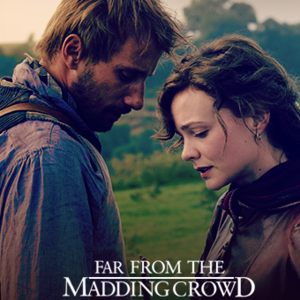
Far from the Madding Crowd (Chap. 32) Thomas Hardy
На этой странице вы найдете полный текст песни "Far from the Madding Crowd (Chap. 32)" от Thomas Hardy. Lyrxo предлагает вам самый полный и точный текст этой композиции без лишних отвлекающих факторов. Узнайте все куплеты и припев, чтобы лучше понять любимую песню и насладиться ею в полной мере. Идеально для фанатов и всех, кто ценит качественную музыку.

NIGHT—HORSES TRAMPING
The village of Weatherbury was quiet as the graveyard in its midst, and the living were lying well-nigh as still as the dead. The church clock struck eleven. The air was so empty of other sounds that the whirr of the clock-work immediately before the strokes was distinct, and so was also the click of the same at their close. The notes flew forth with the usual blind obtuseness of inanimate things—flapping and rebounding among walls, undulating against the scattered clouds, spreading through their interstices into unexplored miles of space.
Bathsheba's crannied and mouldy halls were to-night occupied only by Maryann, Liddy being, as was stated, with her sister, whom Bathsheba had set out to visit. A few minutes after eleven had struck, Maryann turned in her bed with a sense of being disturbed. She was totally unconscious of the nature of the interruption to her sleep. It led to a dream, and the dream to an awakening, with an uneasy sensation that something had happened. She left her bed and looked out of the window. The paddock abutted on this end of the building, and in the paddock she could just discern by the uncertain gray a moving figure approaching the horse that was feeding there. The figure seized the horse by the forelock, and led it to the corner of the field. Here she could see some object which circumstances proved to be a vehicle, for after a few minutes spent apparently in harnessing, she heard the trot of the horse down the road, mingled with the sound of light wheels.
Two varieties only of humanity could have entered the paddock with the ghostlike glide of that mysterious figure. They were a woman and a gipsy man. A woman was out of the question in such an occupation at this hour, and the comer could be no less than a thief, who might probably have known the weakness of the household on this particular night, and have chosen it on that account for his daring attempt. Moreover, to raise suspicion to conviction itself, there were gipsies in Weatherbury Bottom.
Maryann, who had been afraid to shout in the robber's presence, having seen him depart had no fear. She hastily slipped on her clothes, stumped down the disjointed staircase with its hundred creaks, ran to Coggan's, the nearest house, and raised an alarm. Coggan called Gabriel, who now again lodged in his house as at first, and together they went to the paddock. Beyond all doubt the horse was gone.
"Hark!" said Gabriel.
They listened. Distinct upon the stagnant air came the sounds of a trotting horse passing up Longpuddle Lane—just beyond the gipsies' encampment in Weatherbury Bottom.
"That's our Dainty—I'll swear to her step," said Jan.
"Mighty me! Won't mis'ess storm and call us stupids when she comes back!" moaned Maryann. "How I wish it had happened when she was at home, and none of us had been answerable!"
"We must ride after," said Gabriel, decisively. "I'll be responsible to Miss Everdene for what we do. Yes, we'll follow."
"Faith, I don't see how," said Coggan. "All our horses are too heavy for that trick except little Poppet, and what's she between two of us?—If we only had that pair over the hedge we might do something."
"Which pair?"
"Mr. Boldwood's Tidy and Moll."
Комментарии (0)
Минимальная длина комментария — 50 символов.












